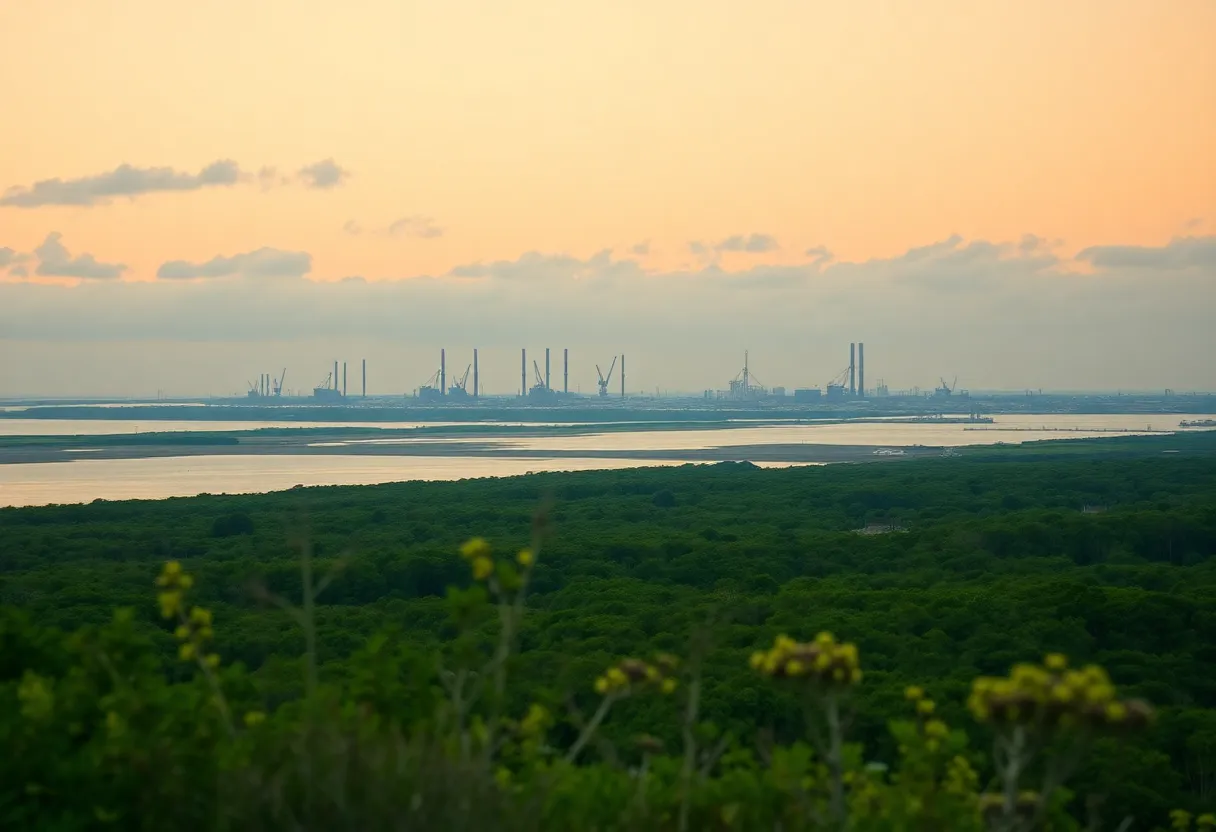News Summary
Environmental advocacy groups have revealed that proposed tax breaks for the liquefied natural gas (LNG) industry could lead to a staggering $21 billion loss in infrastructure funding for Louisiana communities by 2040. The report criticizes Governor Jeff Landry’s inaction on tax policy reforms during a recent special session, raising concerns over local public services and infrastructure needs. With all active LNG facilities benefitting significantly from tax exemptions, critics argue this may lead to considerable long-term economic and environmental consequences for the state.
Lake Charles, Louisiana – A new report released by environmental advocacy groups, including the Sierra Club, indicates that proposed tax breaks for the liquefied natural gas (LNG) export industry could deprive Louisiana communities of over $21 billion in infrastructure funding by the year 2040. This assertion has raised concerns among local residents and lawmakers, particularly regarding the need for essential public services and infrastructure improvements.
The report specifically criticizes Governor Jeff Landry for his failure to amend the Industrial Tax Exemption Program (ITEP) during a recent statewide special session aimed at revising the tax policy. Increased sales taxes have been implemented amid stagnating personal and corporate income tax rates, and several business tax incentives are nearing expiration. As part of this larger context, the report underscores the fiscal ramifications that the LNG export industry is likely to impose on local parishes, specifically Calcasieu, Cameron, and Plaquemines.
According to the data presented, all active LNG export facilities, including three located in Cameron Parish, have benefitted from ITEP breaks amounting to at least 80% of their property tax obligations. If all proposed LNG terminals materialize as planned, the total loss in tax revenue due to these arrangements is poised to reach approximately $20.2 billion by 2040. Anticipated peak revenue loss from tax incentives is expected to coincide with the operational launch of these terminals, slated for 2029.
Moreover, existing LNG operations in Cameron Parish currently hold ITEP agreements with a collective valuation of $11.5 billion over a span of ten years. The report also highlights an additional $492 million in various rebates for LNG export terminals through the state’s Quality Jobs tax incentive program, which is scheduled to phase out after June 30, 2025.
The projected shortfall in tax revenue could significantly impact infrastructure improvements that local communities rely on for healthcare and public services. Interestingly, Commonwealth LNG, which plans to inaugurate an export facility in Calcasieu Pass by early 2024, claims to pledge financial aid to local healthcare systems. However, this has not mitigated concerns over insufficient community investment and rising scrutiny regarding the safety and environmental implications of rapid LNG terminal expansion.
Amid these discussions, critics have voiced skepticism regarding the efficacy of tax incentives like ITEP, arguing that they often leave communities bearing the brunt of environmental and infrastructural costs without substantial economic benefits. This has sparked debates over state tax structures, particularly following a recent ruling by the Louisiana Supreme Court, which dismissed a challenge that would have allowed voters to rethink the state’s tax policies, including potential revisions to severance tax distributions.
Looking forward, lawmakers are expected to re-examine legislative measures enacted during the previous session, particularly concerning severance taxes on oil. Currently, Louisiana imposes a relatively high severance tax rate of 12.5% for oil, which has been cited as a disincentive for drilling activities in comparison to neighboring states. Proposals to adjust severance taxes on natural gas to adopt a value-based system may offer pathways for lowering oil severance taxes, thereby making the state more appealing to energy sector investments.
Louisiana’s Haynesville Shale basin, renowned for its rich natural gas resources, presents significant investment potential for energy companies eyeing opportunities within the state’s lucrative landscape. As the discussions around tax incentives, infrastructure funding, and natural resource management evolve, the future of the LNG industry in Louisiana remains a critical issue for both state lawmakers and local communities.
Deeper Dive: News & Info About This Topic
- La Illuminator: Tax Breaks for LNG Facilities
- The Energy Law Blog: Louisiana State and Local Tax Update
- BIC Magazine: Tax Incentives Fueling LNG Growth
- DeSmog: Tax Breaks for Oil in Louisiana
- NOLA: Oil and Gas Severance Taxes

Author: STAFF HERE NEWORLEANS WRITER
The NEW ORLEANS STAFF WRITER represents the experienced team at HERENewOrleans.com, your go-to source for actionable local news and information in New Orleans, Orleans Parish, and beyond. Specializing in "news you can use," we cover essential topics like product reviews for personal and business needs, local business directories, politics, real estate trends, neighborhood insights, and state news affecting the area—with deep expertise drawn from years of dedicated reporting and strong community input, including local press releases and business updates. We deliver top reporting on high-value events such as French Quarter Festival, New Orleans Jazz & Heritage Festival, and Essence Music Festival. Our coverage extends to key organizations like the New Orleans Chamber of Commerce and Greater New Orleans, Inc., plus leading businesses in energy, healthcare, and education that power the local economy such as Entergy, Ochsner Health, and Tulane University. As part of the broader HERE network, including HEREShreveport.com, we provide comprehensive, credible insights into Louisiana's dynamic landscape.

